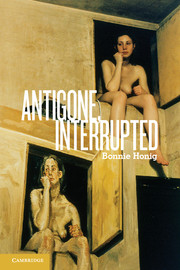Book contents
- Frontmatter
- Contents
- Preface
- Acknowledgments
- Introduction
- Part I Interruption
- 1 Tragedy, maternalism, ethics: toward an agonistic humanism
- 2 “Antigone versus Oedipus,” I: feminist theory and the turn to Antigone
- 3 “Antigone versus Oedipus,” II: the directors’ agon in Germany in Autumn
- Part II Conspiracy
- Notes
- Bibliography
- Index
3 - “Antigone versus Oedipus,” II: the directors’ agon in Germany in Autumn
Published online by Cambridge University Press: 05 May 2013
- Frontmatter
- Contents
- Preface
- Acknowledgments
- Introduction
- Part I Interruption
- 1 Tragedy, maternalism, ethics: toward an agonistic humanism
- 2 “Antigone versus Oedipus,” I: feminist theory and the turn to Antigone
- 3 “Antigone versus Oedipus,” II: the directors’ agon in Germany in Autumn
- Part II Conspiracy
- Notes
- Bibliography
- Index
Summary
The Trauerspiel is conceivable as pantomime; the tragedy is not.
Walter BenjaminTraditional tragedy [is] an inappropriate mirror for contemporary experience. Our modern world may well be, whether we like it or not, the world of melodrama.
Redmond O’HanlonIn many . . . respects the melodrama is the inheritor of many tragic concerns.
Geoffrey Nowell-SmithThe mourning play both repeats and transforms, restores and irremediably dislocates, the agonistic trial in which tragedy has its model . . . one would be tempted to say that it overturns the tragic court of appeals and reinstates the initial verdict, were there any decision. Precisely that, however, does not take place: there is no final verdict . . .
Samuel WeberHaving looked in Chapter 2 at the effects of mobilizing Antigone versus Oedipus in feminist and queer theory, I move here in Chapter 3 to study the tactic again, but this time in a different context. In the film, Germany in Autumn, Antigone is once again invoked against a too highly controlled and violent political order that carries within it unacknowledged generational injustices. Germany in Autumn (1978) is focused on Sophoclean themes: political violence, dissident protest, and state-legitimation in the context of a problematic inheritance – not the incest of Oedipus but the horrors of Nazism. Given this book's aim of assessing the promise and limitations of invoking Antigone (as feeling, phonê, lamentation, dissidence, maternal power) versus Oedipus (as sovereignty, governance, rationalism, patriarchy), this film is especially useful because it also unsettles the binary of Antigone versus Oedipus, staging instead an agon between two quite different Antigones in two sequences made by two different directors. The opposition of Antigone versus Oedipus becomes an agon between two Antigones: the active dissident (and sovereign political actor) versus the vulnerable lamenter.
- Type
- Chapter
- Information
- Antigone, Interrupted , pp. 68 - 82Publisher: Cambridge University PressPrint publication year: 2013

